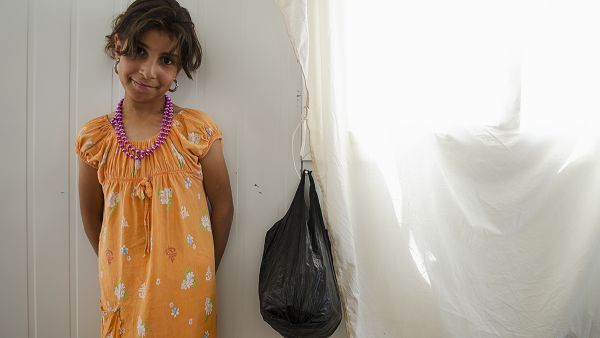ZAATARI, Jordan -- Ahmad al-Lubad doesn’t like to play with toys anymore, unless they’re in the shape of a tank or a gun. The five-year-old Syrian arrived at Zaatari refugee camp at midnight on May 11. His family had fled their home in Sanamayn, a Syrian village near the small but pivotal city of Daraa, just north of the border with Jordan.
According to Ahmad’s father, Mohammad Qassam al-Lubad, much of their village was destroyed by forces loyal to Bashar al-Assad. Mohammad, 58, said that on April 10, government and Lebanese Hezbollah soldiers began breaking into homes, stealing valuables, setting houses on fire, and executing young men in the street.
“I locked the doors and kept my family hidden in the house for 25 days,” he said. “I only left for short periods of time to get food and supplies. Five of my cousins were killed.” At the beginning of May, they fled, staying with family along the way and eventually reaching the Jordanian border and Zaatari.
Mohammad estimated the April 10 death toll of Sanamayn to be more than 100. Another family from the same village, who did not give their names for fear of being targeted by Assad’s regime, confirmed that the event occurred, but said it was impossible to say how many were killed.
Stories like these, ubiquitous among the throngs of tents and caravans that now house more than 144,000 refugees, are impossible to verify. Besides an obscure Youtube video posted after the event, no record of the massacre exists.
Ahmad’s mother, Anoud, said the family’s first night in Zaatari was traumatic because there was a massive thunderstorm, and the children couldn’t stop crying. But she did have one positive memory: “The tent never leaked.”
Zaatari is now the second-largest refugee camp in the world, and the fourth-largest city in Jordan. The country, whose population is around 6.5 million, is estimated to have absorbed more than 500,000 Syrian refugees. Many are stuck in camps, where a financial guarantor is required to exit into Jordan.
Ahmad and his ten-year-old sister, Maryam, often draw in a notebook. Ahmad’s pages are filled with rifles, helicopters, airplanes and tanks. When he grows up, he wants to be a soldier.
Maryam, although only in fifth grade, attends a school for grades six and up. The school is run by the United Nations High Commissioner for Refugees (UNHCR). She said it’s not too difficult for her, and Mohammad smiled with pride and said she’s the best in her class. Her favorite subject is drawing. She loves calligraphy. When she grows up, she wants to be an artist.
Maryam and Ahmad have two older brothers. Ibrahim, 15, is living outside Zaatari with an uncle in the village of Naima.
Qassam, 23, is dead.
He served in the Syrian military. Shortly after the revolution began in March, 2011, Mohammad received a phone call from a government official who told him that his son had broken his neck falling into a swimming pool; he would not be coming home. Mohammad said these stories were common. When soldiers refused to follow orders, they were killed, and their families were given strange explanations of their deaths. He said his sister received a similar phone call about her son in the military. An official said he had fallen during a running exercise, broken his neck and died.
“I want Assad dead so we can return to our lives, so we can return to our home,” said Maryam.
Anoud, her mother, said something similar: “I am ready to strap a bomb to my chest and give Assad a big hug.”
But they did not express hatred for Alawites, the minority Shia religious group that is Assad’s power base. “We have lived with the Alawites peacefully for many years. Of course in any future for Syria, Sunnis and Alawites will have to live side by side. And that’s no problem,” said Mohammad. “They just have to stop killing Sunnis.”
Mohammad was especially horrified that Hezbollah had joined the war on behalf of the regime. He recalled the Israeli-Hezbollah war in 2006, when Lebanese refugees poured across the border into Syria. “I remember driving to the border with others from my village to pick up refugees and take them back to stay in our homes,” said Mohammad. “This is how we are thanked.”








